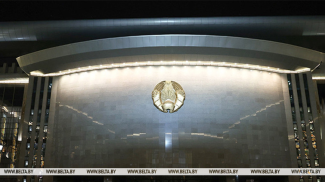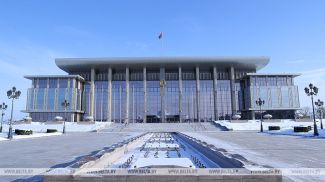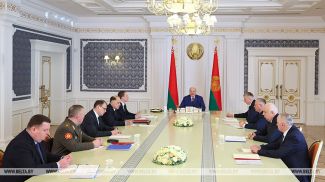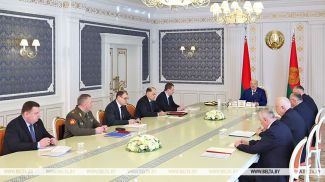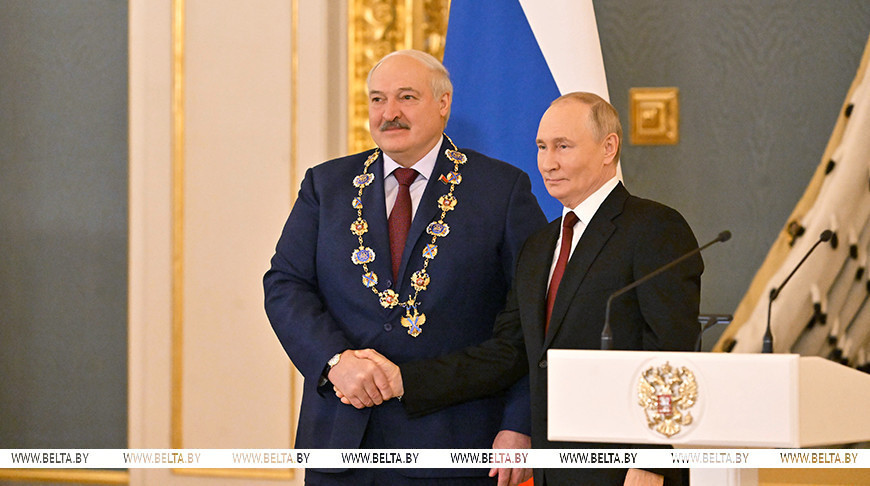
News of the story
"After the Fact: Lukashenko’s Decisions"
December marks the 25th anniversary of the Union State Treaty. This document, which largely determined the development of Belarus and Russia, was signed in Moscow on 8 December 1999. It was signed by Presidents Aleksandr Lukashenko and Boris Yeltsin. A quarter of a century has passed, and the current anniversary is an occasion to take stock of the results and discuss the prospects. In this episode we will tell you why Belarus and Russia set up the union and why any attempt at integration between them was met with fierce opposition from the West. What are the goals of the Union State? Will it have its own currency, constitution and president? What, according to Aleksandr Lukashenko, is the formula for the success of any integration and why is the example of Belarus and Russia a model of the union of sovereign nations?
When did Belarus and Russia establish a union?
In fact, the union between Belarus and Russia is almost three decades old. Our countries started restoring economic ties back in the mid-1990s. The first years after the collapse of the Soviet Union showed that living on opposite sides of the barricades would be impossible. In January 1995, the parties signed the Agreement on Customs Union and a month later the Treaty of Friendship, Good Neighborliness and Cooperation. In April 1996, the Community of Belarus and Russia was formed, and one year later the countries formed a union.
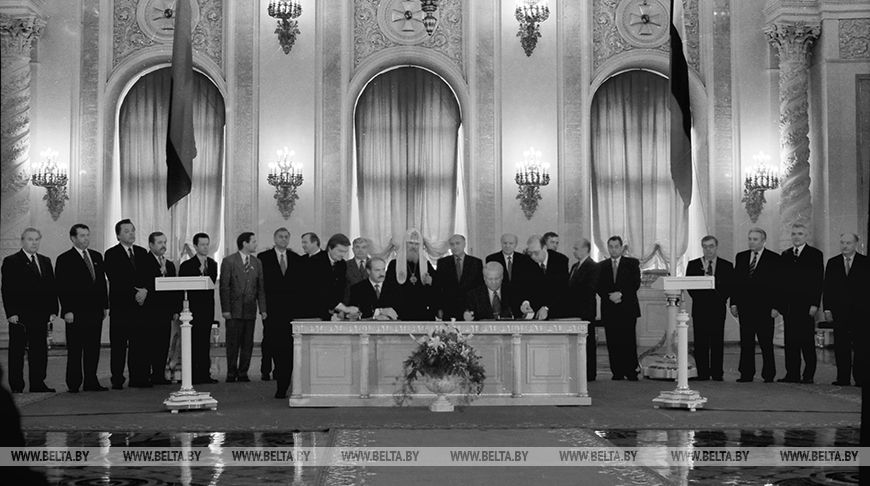
However, the political and economic processes inside both states at that time prevented the countries from fully engaging in integration. The turning point came only at the dawn of the new millennium. On 8 December 1999, the presidents of Belarus and Russia signed the Union State Treaty. This event marked a new chapter in the history of the peoples of the two countries.
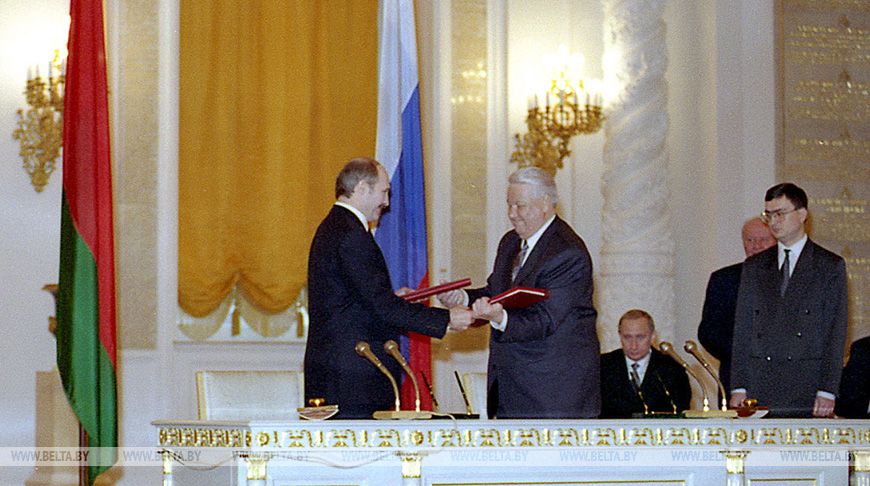
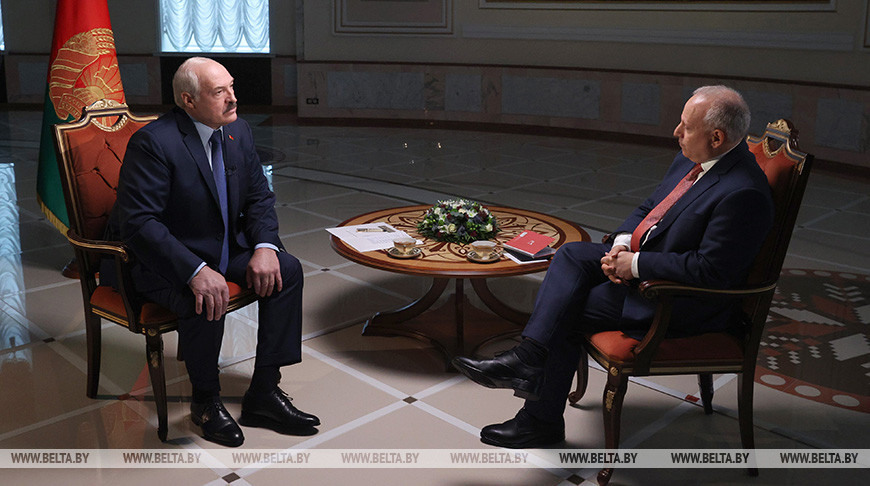
The first results of the work were not long in coming: in nine years, from 1999 to 2008, trade between Belarus and Russia soared five-fold (from $7 billion to almost $35 billion), and the number of Russian regions with which Belarus cooperates went up from 6 to 88.
Three years ago, Aleksandr Lukashenko and Vladimir Putin signed a Union State decree to approve 28 integration programs. This became a kind of reset for the common economic space, it allowed converging legislation and launching new import-substituting projects, including in microelectronics, mechanical engineering and machine tool manufacturing. The results of this work were impressive: in 2023, the two countries posted a record trade of $53 billion, and everything is in place to break this record in the future.
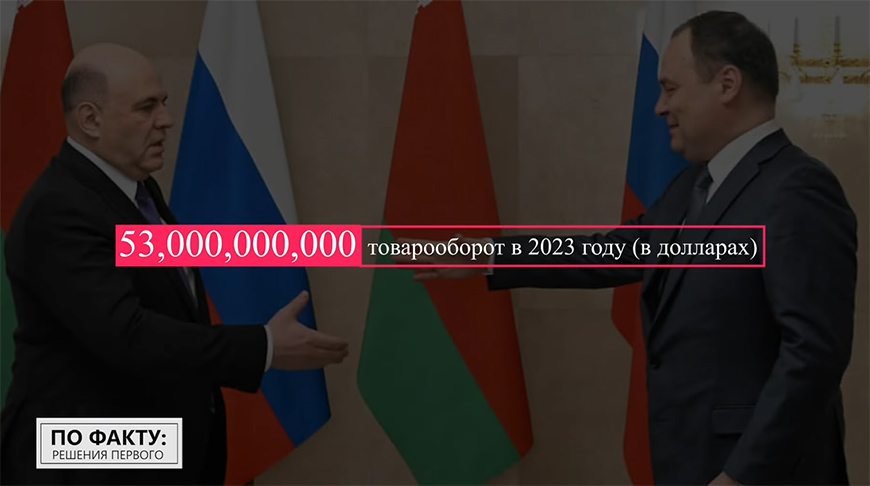
Union State prospects
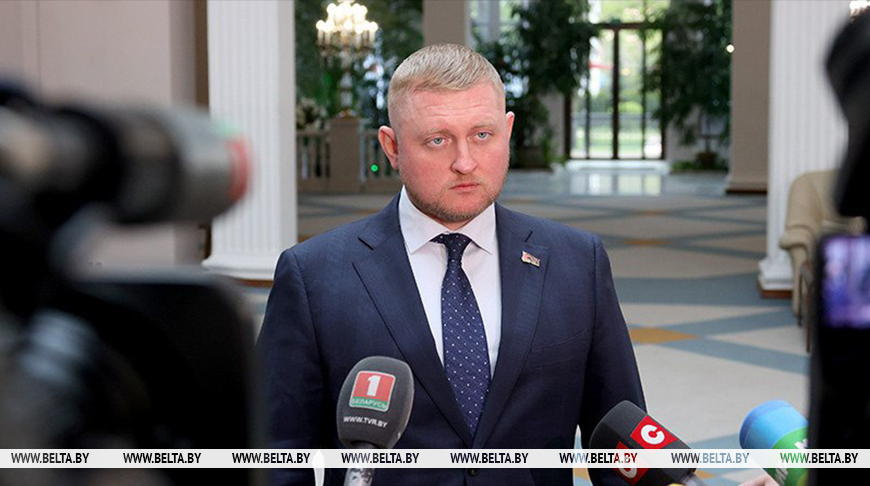
In fact, the union between Belarus and Russia is almost three decades old. Our countries started restoring economic ties back in the mid-1990s. The first years after the collapse of the Soviet Union showed that living on opposite sides of the barricades would be impossible. In January 1995, the parties signed the Agreement on Customs Union and a month later the Treaty of Friendship, Good Neighborliness and Cooperation. In April 1996, the Community of Belarus and Russia was formed, and one year later the countries formed a union.

However, the political and economic processes inside both states at that time prevented the countries from fully engaging in integration. The turning point came only at the dawn of the new millennium. On 8 December 1999, the presidents of Belarus and Russia signed the Union State Treaty. This event marked a new chapter in the history of the peoples of the two countries.

The goals of the Union State were defined as peaceful and democratic development of the fraternal peoples, strengthening friendship, improving welfare and living standards and also developing a common economic space and coordinating social, defense and foreign policies. Promoting peace, security and mutually beneficial cooperation in Europe and around the world. At the same time, the treaty specifically pointed out that the work on the economic and social agenda of the Union State would proceed in stages depending on the priority of the goals. The parties would consider adopting a Union State constitution as the work on the Union State formation progresses.
"When you and the Americans are building an alliance, there is no talk of a queen or a parliament [presiding over the alliance]. The same here, when we started building our alliance in the mid-1990s (with Yeltsin), we made it clear that this would be an alliance of two countries - Belarus and Russia. And it would be more powerful than a single state. I'm telling you this frankly. And I swear to you - we have never discussed with Putin whether we would have one president or two presidents. Never!" Aleksandr Lukashenko Interview with BBC in 2021.

Advantages of Belarusian-Russian integration.
The first results of the work were not long in coming: in nine years, from 1999 to 2008, trade between Belarus and Russia soared five-fold (from $7 billion to almost $35 billion), and the number of Russian regions with which Belarus cooperates went up from 6 to 88.
Three years ago, Aleksandr Lukashenko and Vladimir Putin signed a Union State decree to approve 28 integration programs. This became a kind of reset for the common economic space, it allowed converging legislation and launching new import-substituting projects, including in microelectronics, mechanical engineering and machine tool manufacturing. The results of this work were impressive: in 2023, the two countries posted a record trade of $53 billion, and everything is in place to break this record in the future.

Union State prospects
“From the point of view of the future, joint projects on space exploration, Arctic shelf development, nuclear energy deserve attention,” said Aleksandr Shpakovsky, a member of the House of Representatives.
He remarked that the Belarusian nuclear power plant was built using Russian technologies, which are the most advanced in the world today. "We have essentially created a new economic sector from scratch, and we might consider building a third reactor or a second nuclear power plant. In other words, cooperation in nuclear energy seems very promising," the MP believes.
"About 10,000 enterprises of Belarus and Russia are entangled economically with each other; several million people in Russia work for enterprises and organizations that cooperate with Belarus in one way or another. All this can be scaled up," Aleksandr Shpakovsky emphasized.

The parliamentarian recalled that Head of the Belarus President Administration Dmitry Krutoi, who once headed the Belarusian diplomatic mission in Moscow, said a couple of years ago that the countries could double bilateral trade within five years.
"There is room for growth. Therefore, we absolutely disagree with individual skeptics who say that Belarus and Russia have reached a certain ceiling in trade. That's not true. There are sufficient reserves on the domestic market. We can and should enter foreign markets with high-tech products. And this is not only about import substitution, but also about import preemption. A lot depends on whether joint projects in microelectronics, machine tool building and aircraft manufacturing will succeed," noted Aleksandr Shpakovsky.
Our humanitarian cooperation has benefited citizens of the Union State in many ways: there are no restrictions on the freedom of movement, transportation of goods and services, choice of the place of residence and employment. The two countries agreed on mutual recognition of pensions, introduced equal rights in healthcare, education and in many other areas of ‘social adaptation’. True, there is still something to strive for.
"The Standing Committee should be involved in addressing everyday issues facing ordinary people. The Standing Committee was instructed to take stock of progress to ensure equal rights of citizens. A lot has been done, but there are still enough problems to tackle. And for some reason we do not talk about them: inspections at airports, roaming, the lack of train tickets on holidays (because the demand exceeds the supply). Who is supposed to deal with these issues?" the head of state asked at the July session to discuss international issues.
How close can relations between Belarus and Russia be?
The foundation of Belarus-Russia relations are based on unshakable principles of friendship and good neighborliness, mutual respect and consideration of each other's interests, as well as a common history, shared moral and spiritual values, strong family ties between many Belarusians and Russians. Aleksandr Lukashenko emphasized that our main achievement is that we have preserved the basis. Today it serves as the framework for bilateral cooperation.
"I have always insisted that a house - if we look at the Union State as a house - must rely on the foundation. What is the foundation of our relations? Economy. Therefore, we need to build the economic basis of the union. The second thing is that we have a common fatherland from Brest to Vladivostok. You can't do anything about it. This is how it has been for decades, centuries. It so happened, through no fault of ours, that there are two states in this space. Two sovereign states: Belarus and huge Russia,” Aleksandr Lukashenko emphasized in a recent interview with Izvestia. “I often say that Putin and I are wise people. We have enough experts to build the relations in the Union State that will be closer and stronger than in a unitary state. No one’s angry, no one’s hurt. We need such relations.”
Why do ill-wishers try to slow down this integration process in every possible way? It is simple. No one needs an effective and dangerous competitor in the global market. Therefore, the opponents of the Union State persistently continue to engage in mystification and regularly (but, thank God, unsuccessfully) try to pit the two presidents against each other. Statements about absorption and loss of sovereignty have become a kind of a mantra of enviers.
“Unscrupulous critics in foreign countries either do not know what they are talking about or deliberately mislead people who are unaware of the situation. The issue is not about absorption. The issue is about economic policy harmonization. This is the way it is done in many other integration associations. Everything else is nonsensical. These are attempts of our ill-wishers to slow down our integration process,” Russian President Vladimir Putin said following the meeting with his Belarusian counterpart in Minsk in late 2022.
Vladimir Putin emphasized then: “Belarus is not only our good neighbor, with whom we have been working, taking into account each other's interests, for all the previous decades, but it is also our ally in the truest sense of the word.”
According to him, all issues between the states, including those in the economic sector, are solved keeping this in mind.
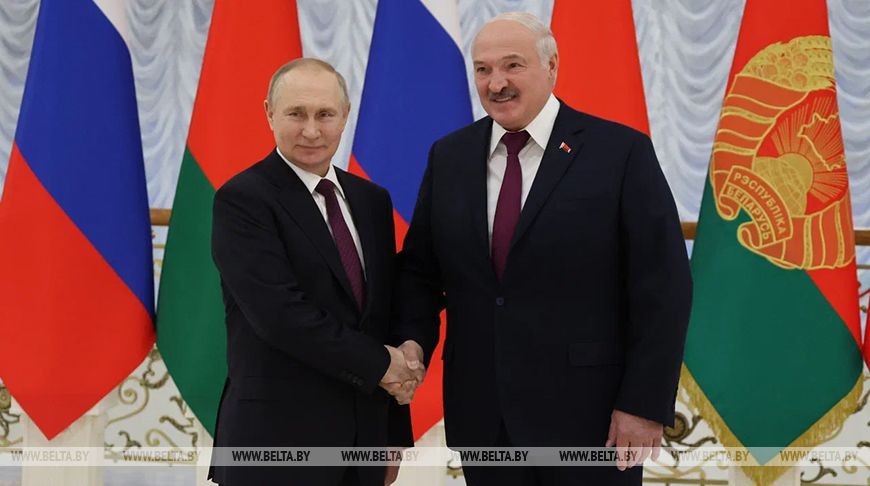
Recently the Russian leader has expressed confidence that by joint efforts Belarus and Russia will continue to develop bilateral cooperation and strengthen mutually beneficial economic interaction, to reliably protect the security of the two countries and the common Union State.
Are Belarus and Russia losing their sovereignty in the Union State?
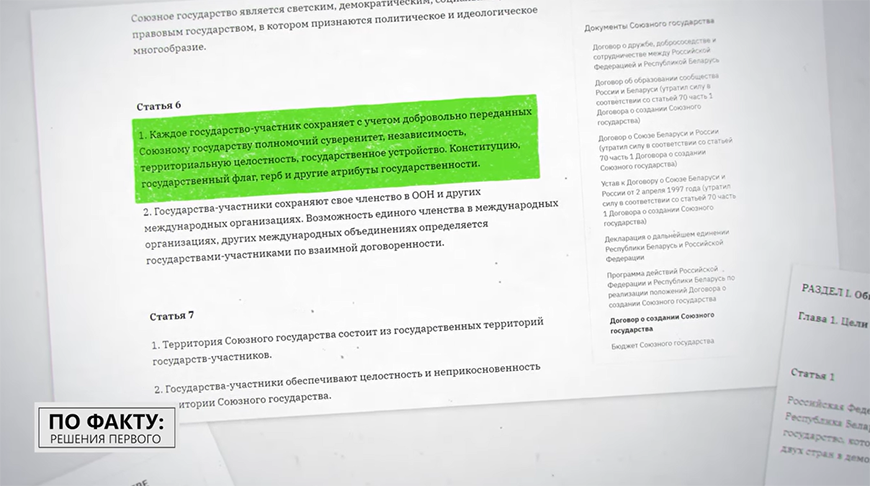
Take a close look at the treaty. It is written in black and white that the Union State is based on the principles of sovereign equality of the member states, and each party retains its sovereignty, independence, territorial integrity and state structure. The official languages of the Union State are the official languages of the participating states. The document itself is drawn up in two copies - in Russian and Belarusian. Both texts have equal force. Is there any hint here of a loss of sovereignty?
“We are developing a model of economic integration. This is task number one. There is also a new task: it is important for us to develop a model of interaction between a medium-sized state and a great power. After all, the Russian Federation will never change its potential and resource base, i.e. it will remain as it is today. Belarus will also remain within its geographical and resource limits. Therefore, what we are doing today is not just developing economic models. We are developing models of political, cultural and humanitarian integration. By the example of Belarus and Russia, we have managed to prove that these relations can be mutually beneficial and respectful. Today it is hard to say who needs whom more,” said Olga Lazorkina, analyst of the Belarusian Institute of Strategic Research (BISR).
In her opinion, it is also important for the Union State to gain international subjectivity. “In order to gain a foothold in the international arena, it is necessary to have an internal platform. Now we are developing it. The internal platform is not only the economy. It is also a political model, cultural, humanitarian and ideological one,” the BISR analyst added.
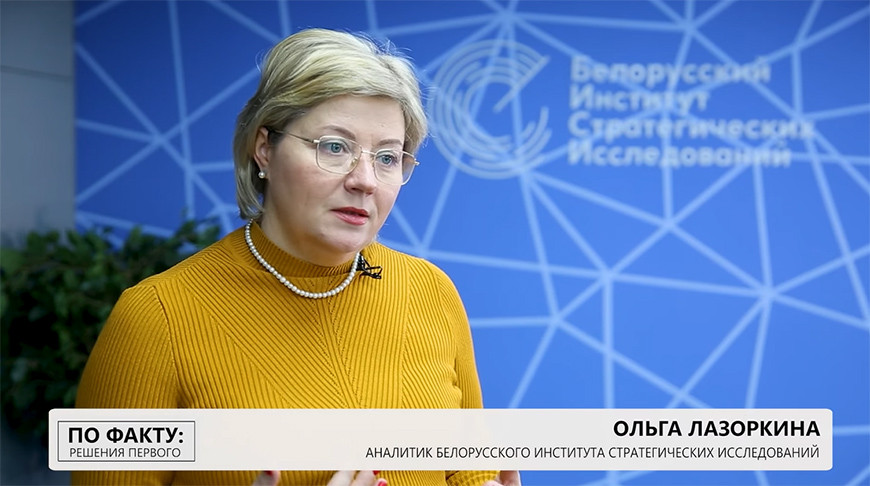
Aleksandr Lukashenko stated during his talks with Vladimir Putin in October 2024 that Belarus and Russia were fighting together for a just world today. “And the union of Belarus and Russia is at the forefront of this fierce struggle. There is no alternative to such a course amid the tense, escalating international situation. At the same time, the Union State may well become a model of new equal relations,” the president stressed.
The Union State of Belarus and Russia is not a political project as it may seem at first glance. It was a bottom-up idea consolidated at the highest level. Aleksandr Lukashenko believes that our allied relations have become an example of a peaceful and constructive agenda. Moreover, Belarus and Russia have managed to anticipate today's tectonic shifts in all sectors, and now it is our time. Strong sovereign states mean a strong union. According to the Belarusian president, this is the formula for the success of any integration. This model has chances for success and expansion. No coercion and no absorption.
“Unscrupulous critics in foreign countries either do not know what they are talking about or deliberately mislead people who are unaware of the situation. The issue is not about absorption. The issue is about economic policy harmonization. This is the way it is done in many other integration associations. Everything else is nonsensical. These are attempts of our ill-wishers to slow down our integration process,” Russian President Vladimir Putin said following the meeting with his Belarusian counterpart in Minsk in late 2022.
Vladimir Putin emphasized then: “Belarus is not only our good neighbor, with whom we have been working, taking into account each other's interests, for all the previous decades, but it is also our ally in the truest sense of the word.”
According to him, all issues between the states, including those in the economic sector, are solved keeping this in mind.

Recently the Russian leader has expressed confidence that by joint efforts Belarus and Russia will continue to develop bilateral cooperation and strengthen mutually beneficial economic interaction, to reliably protect the security of the two countries and the common Union State.
Are Belarus and Russia losing their sovereignty in the Union State?

Take a close look at the treaty. It is written in black and white that the Union State is based on the principles of sovereign equality of the member states, and each party retains its sovereignty, independence, territorial integrity and state structure. The official languages of the Union State are the official languages of the participating states. The document itself is drawn up in two copies - in Russian and Belarusian. Both texts have equal force. Is there any hint here of a loss of sovereignty?
“We are developing a model of economic integration. This is task number one. There is also a new task: it is important for us to develop a model of interaction between a medium-sized state and a great power. After all, the Russian Federation will never change its potential and resource base, i.e. it will remain as it is today. Belarus will also remain within its geographical and resource limits. Therefore, what we are doing today is not just developing economic models. We are developing models of political, cultural and humanitarian integration. By the example of Belarus and Russia, we have managed to prove that these relations can be mutually beneficial and respectful. Today it is hard to say who needs whom more,” said Olga Lazorkina, analyst of the Belarusian Institute of Strategic Research (BISR).
In her opinion, it is also important for the Union State to gain international subjectivity. “In order to gain a foothold in the international arena, it is necessary to have an internal platform. Now we are developing it. The internal platform is not only the economy. It is also a political model, cultural, humanitarian and ideological one,” the BISR analyst added.

Aleksandr Lukashenko stated during his talks with Vladimir Putin in October 2024 that Belarus and Russia were fighting together for a just world today. “And the union of Belarus and Russia is at the forefront of this fierce struggle. There is no alternative to such a course amid the tense, escalating international situation. At the same time, the Union State may well become a model of new equal relations,” the president stressed.
The Union State of Belarus and Russia is not a political project as it may seem at first glance. It was a bottom-up idea consolidated at the highest level. Aleksandr Lukashenko believes that our allied relations have become an example of a peaceful and constructive agenda. Moreover, Belarus and Russia have managed to anticipate today's tectonic shifts in all sectors, and now it is our time. Strong sovereign states mean a strong union. According to the Belarusian president, this is the formula for the success of any integration. This model has chances for success and expansion. No coercion and no absorption.




